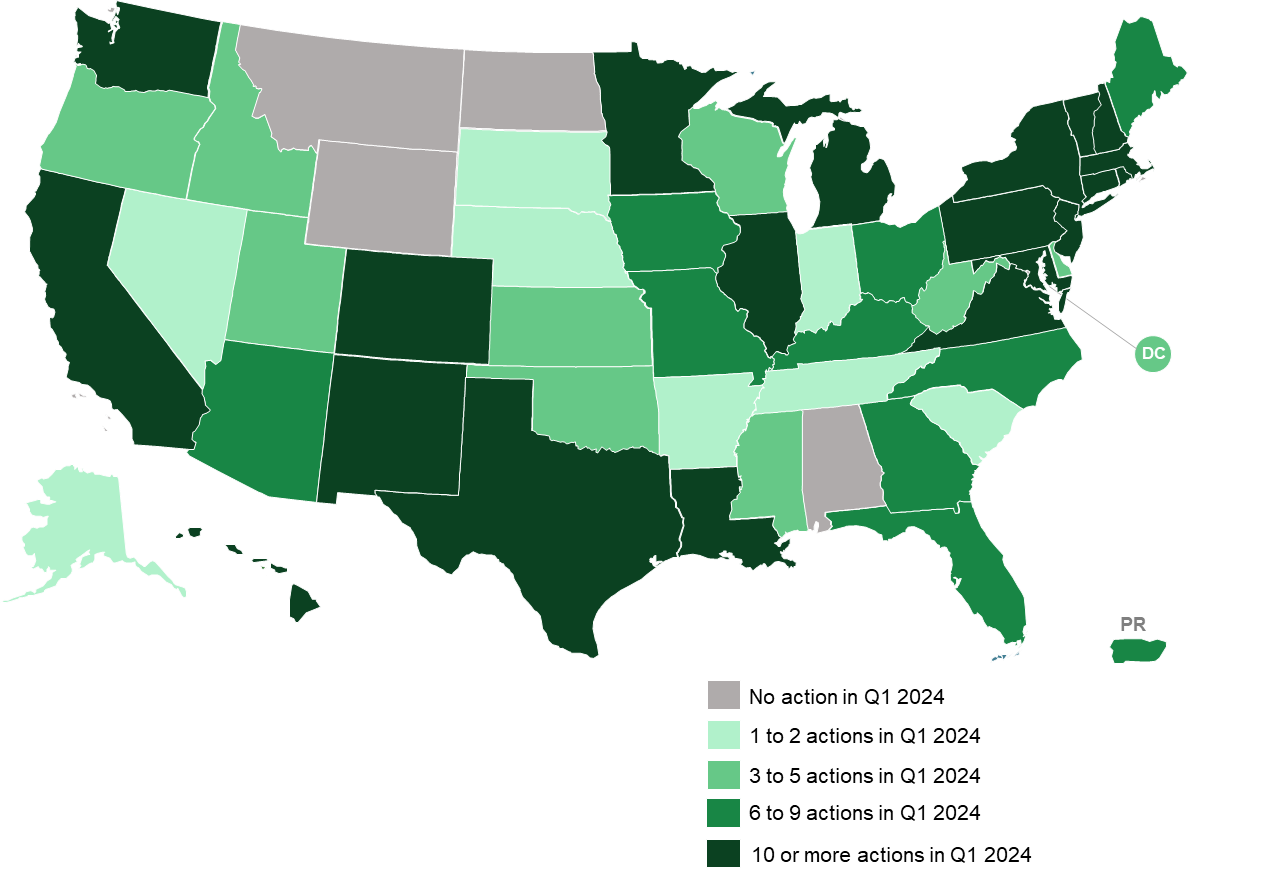The 50 States of Electric Vehicles: States Consider Pulling Back or Prohibiting Zero-Emission Vehicle Targets in Q1 2024
Raleigh, NC – (May 9, 2024) The N.C. Clean Energy Technology Center (NCCETC) released its Q1 2024 edition of The 50 States of Electric Vehicles. The quarterly series provides insights on state regulatory and legislative discussions and actions on electric vehicles and charging infrastructure.
The report finds that 46 states, plus the District of Columbia and Puerto Rico took actions related to electric vehicles and charging infrastructure during Q1 2024 (see figure below), with the greatest number of actions relating to rebate and grant programs; registration, mileage, or charging fees for electric vehicles; state procurement of electric vehicles; charging infrastructure planning activities; and rules governing publicly available charging stations. States also continued to take actions planning for National Electric Vehicle Infrastructure (NEVI) program funding distribution.
A total of 595 electric vehicle actions were taken during Q1 2024, with the most active states being Massachusetts, New York, California, Illinois, New Jersey, Minnesota, Hawaii, and Maryland. So far in 2024, 16 states have enacted legislation related to transportation electrification, as of early May 2024.
Q1 2024 State and Utility Action on Electric Vehicles

The report discusses three trends in electric vehicle actions taken in Q1 2024: (1) states considering pulling back or prohibiting zero-emission vehicle targets, (2) lawmakers pursuing battery recycling requirements, and (3) states and utilities advancing bidirectional charging programs.
“This quarter, lawmakers in several states, including Minnesota, New Mexico, New York, and Washington, considered legislation to repeal previously enacted standards and mandates related to the adoption of EVs,” said Emily Apadula, Policy Analyst at NCCETC. “This follows another recent trend in legislation to restrict or prevent state agencies from adopting vehicle emissions standards and/or EV mandates.”
The report notes five of the top policy developments of the quarter:
- New Mexico policymakers and regulators advancing transportation electrification with a clean fuel standard, tax credits, transportation electrification plans, and charging-enabled parking requirements;
- Maryland lawmakers driving opportunities for bidirectional charging;
- Connecticut regulators releasing a proposal for medium- and heavy-duty vehicle charging;
- DTE Electric filing a transportation electrification plan in Michigan; and
- Colorado regulators approving Black Hills Energy’s transportation electrification plan.
“Some states are pumping the brakes on EV adoption targets, while other states are examining policies to better integrate this new load,” observed Brian Lips, Senior Project Manager at NCCETC. “Proving that one size does not fit all, states continue experimenting with different approaches to different EV market segments.”
View the 50 States of Electric Vehicles Q1 2024 Quarterly Report Executive Summary
View and Purchase the 50 States of Electric Vehicles Q1 2024 Quarterly Report
View other 50 States Reports – Solar, Grid Modernization, Electric Vehicles and Decarbonization
ABOUT THE NC CLEAN ENERGY TECHNOLOGY CENTER
The NC Clean Energy Technology Center, as part of the College of Engineering at North Carolina State University, advances a sustainable energy economy by educating, demonstrating and providing support for clean energy technologies, practices and policies. It serves as a resource for innovative, sustainable energy technologies through technology demonstration, technical assistance, outreach and training. For more information about the Center, visit: http://www.nccleantech.
Media Contact: Shannon Helm, shannon_helm@ncsu.edu